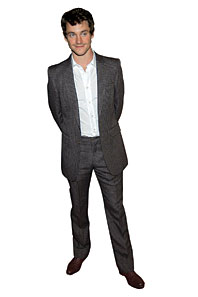
B lame it on his smooth-cheeked looks and his role as Prince Charmont in Ella Enchanted: Hugh Dancy keeps getting pegged as the Next Big British Boy Toy. But given his résumé (Black Hawk Down, Madame Bovary, and a forthcoming Rwanda film), his starring role on Broadway as a weary World War I officer isn’t out of character. In R. C. Sherriff’s 1928 Journey’s End, Dancy, 31, takes a role originated by the young Laurence Olivier. He talked to Boris Kachka about the perils of cute-guy-hood.
The show comes from London, after an acclaimed two-year run. Did you see it? I didn’t, actually, which I’m now slightly grateful for, because I came to it completely fresh. I’m one of the very few people in Britain ever not to have studied or read the play. I was a Journey’s End virgin.
But you did get an English degree at Oxford. Did that help your acting chops? I think I should say not very much.
You’ll be appearing in The Jane Austen Book Club too. What do you make of her pop-culture ubiquity? I guess she just wrote really bloody good stories. But a lot of it comes down to just laziness—this is probably going to be a stick for me to be beaten with, but how many more times can you use the script of Pride and Prejudice?
That kind of role got you labeled as the New Colin Firth, then the New Orlando Bloom … You just keep plugging away, and the speciousness of that kind of analysis reveals itself. There’s only so many New people you can be before people give up.
Surely your looks have helped, though. I’ve probably benefited from being able to play younger than I am. But after a while you realize playing an ingenue is of limited shelf life. And I have in the past year worked on film projects which have reached into that dark area a bit more.
Your next movie, Beyond the Gates, seems to qualify—it was shot in the Rwandan school where your character sheltered victims from genocide. It was a very potent experience. A lot of people say, “I’ve read there were actual survivors who were involved in the making of the movie.” What is hard to understand is that anything you do in Rwanda involves survivors, because everybody to some extent is a survivor. It saturates the society.
Your character in Journey’s End is a bit less heroic— an officer who’s become a mean, flailing alcoholic. But one of the things I always thought was interesting about Stanhope is that there’s always the ghost of another character walking beside him, which is the boy that he was. So in a sense, the journey of the character has to some extent already happened when you see him onstage. It’s an overused word, journey. A bit like arc. I always think of animals coming in two by two.
Journey’s End
At the Belasco Theate; in Previews for a February 22 Opening